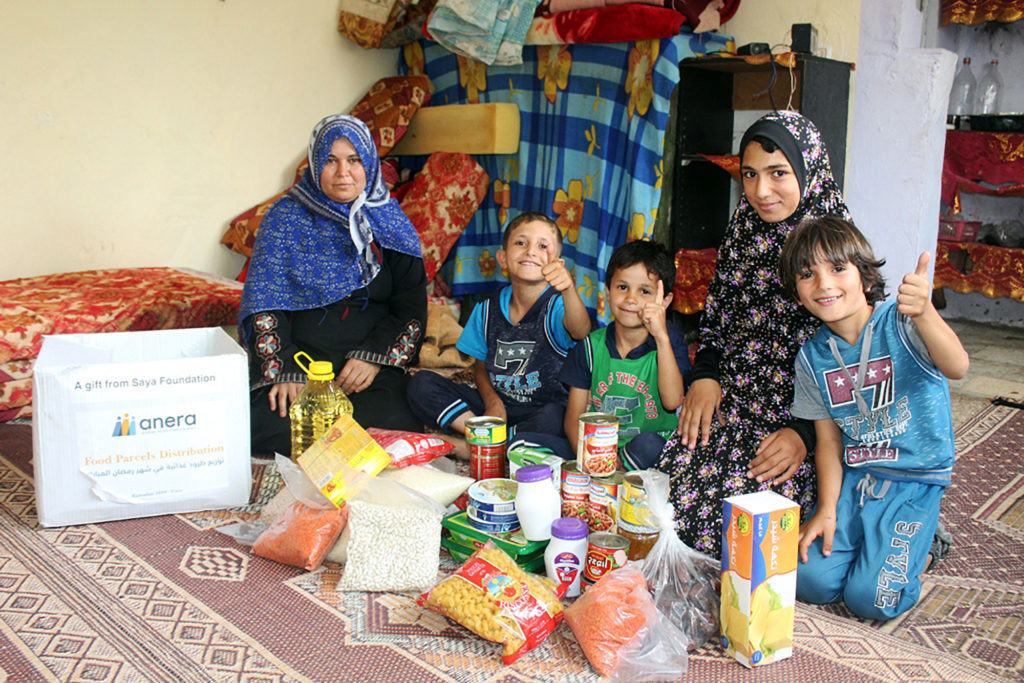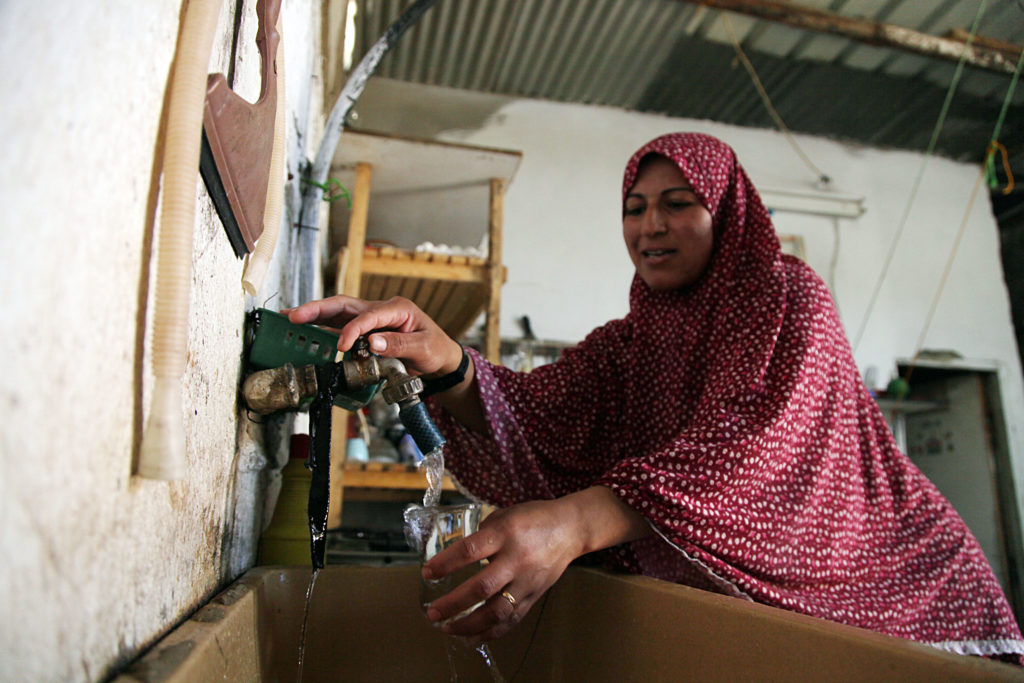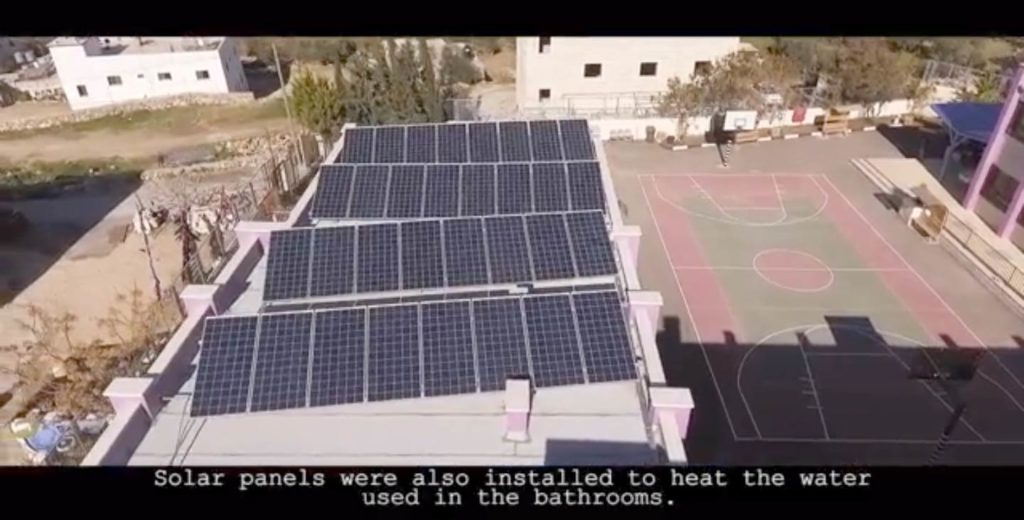11 ways Anera supports achieving the Sustainable Development Goals
Posted in: Programs
Considering Anera’s work within an international framework
Anera’s goal is to help people in difficult situations live lives filled with dignity, meaning and hope. We do so by providing emergency supplies when disaster strikes, and by implementing long-term programs covering health, education, livelihoods, women’s empowerment and other critical issues.
Creating stronger communities requires building up and building on local expertise, rather than imposing a top-down development model. The staff in our 12 offices in Lebanon and Palestine come from the communities they serve. Whether we’re arranging medical care in refugee camps or vocational training centers, our team members draw on an intimate understanding of local history and culture to deliver meaningful, long-term results.
Anera’s programs are wide-ranging. Our staff include specialists in health, education, agriculture, civil engineering, procurement and commodity management, information technology and community development. Across these sectors, Anera is committed to ensuring shared dignity and healthier, more fulfilling futures for all people in the communities where we work.
The challenges confronting the communities we work with do not exist in a vacuum. Solutions require international solidarity and partnership. Within a global framework, the United Nations is one important venue for collective action.
In 2015, UN member nations adopted 17 “Sustainable Development Goals” under the rubric of the 2030 Agenda for Sustainable Development. The SDGs, otherwise known as the Global Goals, were developed over the course of several years with input from civil society, governments, the private sector and academia. The goals established at the 2015 UN summit built on the earlier Millennium Development Goals that were established by the United Nations in 2000.
Anera’s programs are very much aligned with the SDGs. As a civil society organization, we recognize the central role of organizations like ours and our local and international partners to achieving the Agenda 2030 SDGs.
History of the SDGs
Entering into force on January 1, 2016, the Global Goals set global targets for the next 15 years for all nations to “end all forms of poverty, fight inequalities and tackle climate change, while ensuring that no one is left behind.”
Trying to ensure that the goals are met is now the subject of considerable international activity. Last month, the UN Conference on South-South Cooperation met to discuss implementation of the 2030 agenda. This summer, governments will review their progress in New York at the UN High-Level Political Forum. And earlier this month in Beirut, Lebanon, the Arab Forum for Sustainable Development 2019 focused regional attention on the subject.
Tracking tools like the Arab Development Portal allow the public to check regional progress in implementing the Global Goals. The SDG Tracker, maintained by the University of Oxford, provides a similar measure of global progress toward the UN benchmarks.
There is a long way to go in the next decade to meet the goals. In the Middle East, improving health care to meet the SDGs is one significant challenge among many. Collaboration from many sectors, institutions, and individuals is required to attain the goals.
Many of Anera’s programs directly address the Agenda 2030 goals – and often multiple goals at once. Well-integrated holistic programs can reinforce these aims in overlapping ways. One study found, for instance, that cash transfers programs in South Africa had a positive impact on four Agenda 2030 goal outcomes. In partnership with UN agencies and international and local partners, Anera’s programs are contributing to the larger targets of the Global Goals.
Anera’s work through the lens of the 2030 Global Goals
“Economic growth must be inclusive to provide sustainable jobs and promote equality.”
Anera, in partnership with IRUSA, recently launched a cash assistance program in the West Bank to support women-headed households.
In Lebanon, Anera’s livelihood programs help to open opportunities to vulnerable youth.
“This course didn’t just teach me how to cook. It taught me how to think like a professional chef: how to price each meal, how to select my ingredients effectively, and how to properly decorate my plates.” – Chef Ahmad on Anera’s vocational course
And with support from UMCOR, Anera has launched an innovative cash assistance program in northern Lebanon. Assistance through cash transfers is the most direct, efficient and effective method to quickly address basic shelter and other needs. Anera’s cash program is unique in that it provides assistance to vulnerable Lebanese host communities, to avoid exacerbating tensions between the two groups.
“The food and agriculture sector offers key solutions for development, and is central for hunger and poverty eradication.”
Anera works to combat hunger – providing immediate aid by distributing healthy food packages in Gaza and Lebanon in emergencies and during the month of Ramadan – and through longer-term, sustainable efforts like building family-owned greenhouses in Gaza so that families can grow food for themselves and sell the surplus for extra income.


“Ensuring healthy lives and promoting the well-being for all at all ages is essential to sustainable development.”
Anera’s in-kind programs help get badly-needed medicines and medical supplies where they are needed most.
Our public health awareness sessions help educate families about best practices for maintaining good health and identifying health problems.
And our youth sports programs provide opportunities for vulnerable youth to play and lead healthy, active lifestyles.
“Obtaining a quality education is the foundation to improving people’s lives and sustainable development.”
Anera’s education programs support young children and youth across Palestine and Lebanon.
In Palestine, Anera has built 10 percent of all preschools. This year, we are engaged in building 10 new preschools. In partnership with the Palestinian Ministry of Education, Anera is bolstering early childhood development across Palestine.
Because Anera takes a holistic approach to education, we also support healthy psychological and emotional development and health through our psychosocial programs for young children in Gaza.
In Lebanon, Anera opens educational pathways for vulnerable youth by providing informal education programs for out-of-school youth, and classes enabling students to reenter formal education. Our vocational programs enable young people to obtain the skills necessary to find stable jobs.
“Gender equality is not only a fundamental human right, but a necessary foundation for a peaceful, prosperous and sustainable world.”
One of Anera’s core priorities is supporting the well-being of women and girls.
This focus is realized through our gender-inclusive youth sports programs for refugees and other vulnerable children in Lebanon, and through our education and economic development programs that target women and girls.
“People around me were surprised when I signed up for this course. Especially my family. “It’s a man’s career,” they would say. But I did not see it that way. I mean, is there really such a thing anymore nowadays? Women can do anything. All you need is courage!” – Tahani, electrical course student
And this year, with funding from IRUSA, Anera launched the Women Can program in the West Bank, providing assistance to female entrepreneurs to develop their small enterprises. The initiative is designed to empower Palestinian women who are the heads of their households to increase their economic autonomy and the financial resources of themselves and their families.
Since 1995, Anera Anera and our local partner, the Culture and Free Thought Association, have provided working capital to low income women to reduce poverty, create employment, and generate income through the Gaza Women Loan Fund. The initiative empowers low-income women to launch small businesses to help sustain their families despite Gaza’s high unemployment rate. The results have been astonishing. Aida says the loan she got in 2010 changed her life.
“Clean, accessible water for all is an essential part of the world we want to live in.”
Anera has worked for years to improve water and sanitation infrastructure. In just the last decade alone, Anera has expanded services to more than 800,000 people in the West Bank and Gaza, including providing 500,770 people with improved access to potable water.
In the West Bank, Anera has worked in Jenin and Ramallah to build critical wastewater reuse infrastructure and improve the efficiency and sustainability of irrigation.
In Lebanon, we are responding to the national garbage crisis with a holistic solid waste management program in Akkar and Bekaa that engages community involvement and encourages waste sorting at source, alongside the constructing waste sorting facilities to greatly reduce the amount of garbage that is landfilled or, worse, open dumped or burned.


“It’s a huge relief to wake up, turn on the tap, and see water come out immediately.” – Rawda, Al Mograqa, Gaza
“Energy is central to nearly every major challenge and opportunity.”
Wherever possible, Anera incorporates solar panels in the construction and renovation of medical clinics and schools. For instance, the new Bazariya Preschool that Anera is constructing in the northern West Bank will have solar panels and big windows to let in lots of natural light. In Gaza, we recently installed solar panels on two clinics serving marginalized areas.


“Sustainable economic growth will require societies to create the conditions that allow people to have quality jobs.”
Anera’s vocational education, livelihoods and job skills training programs provide vulnerable families with tools to find decent work.
“To reduce inequalities, policies should be universal in principle, paying attention to the needs of disadvantaged and marginalized populations.”
Anera works with refugees from Palestine and Syria and other vulnerable communities in the Middle East, contributing to broader efforts to reduce inequality between and within countries.
“Sustainably manage forests, combat desertification, halt and reverse land degradation, halt biodiversity loss”
Protecting the environment is a longstanding priority for Anera. Alongside Anera’s programs to improve water management and sustainable agriculture in the West Bank, we have also sought to help promote and preserve knowledge of the ancient art for building and maintaining terraces on the land.
“Revitalize the global partnership for sustainable development. A successful sustainable development agenda requires partnerships between governments, the private sector and civil society.”
Anera’s institutional and individual donors and local partners are essential to what we do. In the communities where we work, local partners like the Women’s Program Association (Lebanon) are vital to successful implementation of our programs.
International Anera partners like International Health Partners, Johnson & Johnson (which has publicly expressed its commitment to supporting the SDGs), InterMilan and many more provide the resources to meet needs of vulnerable populations.
